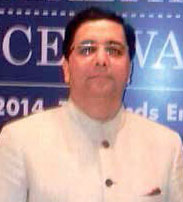Surrogacy under Scanner
The Bombay High Court’s interim order, staying the directive of the Union government banning surrogacy for foreign couples, has ignited a debate over the regulation of commercial surrogacy in India By Amresh K Tiwary
Though India is emerging as a major destination for surrogacy because of its relatively low cost, there are still a number of complex legal and ethical issues involved. Recently, the Bombay High Court in its an interim order stayed the directive of the Union government and the Indian Council for Medical Research banning surrogacy for foreign couples who are in the final stages of the process. The High Court clarified that its order was restricted to cases in the midst of treatment. It asked the clinics to furnish details of such cases to the authorities. The Court also barred them from taking up fresh cases of surrogacy for foreign couples.
The doctors’ fraternity has opposed the Surrogacy Bill. According to A K Agarwal, President, Delhi Medical Council and Professor of Excellency, Maulana Azad Institute of Medical Science, New Delhi, the bill is against the law of the land as it denies fertility treatment to the common man, and seeks to raise the cost of treatment severely and restrict the facilities.
“The bill is against the law of the land and as it denies fertility treatment to the common man, and seeks to raise the cost of treatment severely and restrict the facilities. Incidentally, the Centre, in an online statement, announced that the ban will not affect surrogacy cases already underway and or exit of children born out of surrogacy before November 4. It added that overseas citizen of India cardholders, cannot seek surrogacy in India”
A K Agarwal
President, Delhi Medical Council and Professor of Excellency, Maulana Azad Institute of Medical Science, New Delhi

Incidentally, the Centre, in an online statement, announced that the ban will not affect surrogacy cases already underway and or exit of children born out of surrogacy before November 4. It added that overseas citizen of India cardholders, too, cannot seek surrogacy in India.
The High Court, rejecting the Centre’s contention that there was no urgency in the matter, said before introducing a sudden change in policy, prior notice should have been given. The preparatory steps to commission surrogacy consume time, energy and cost, apart from pain and suffering by the individuals. Once such process is set in motion, it becomes very difficult to abandon or postpone it at the crucial stage,” said the judge. Under these circumstances where the court fails to interfere in the matter, the same shall result in travesty of justice.
The court has pointed out that by the government’s own admission, commercial surrogacy had not been banned and recognition of clinics not suspended. “It is therefore expected that the Government will take into consideration the repercussion of suddenly banning surrogacy prevailing for 10 years, without notice,” the High Court said. “Change in the policy with prior notice would be more desirable and in absence of it, the doctrine of legitimate expectation would operate to save the time, energy and cost and the physical and mental sufferings and pain under gone by the parties. Such parties cannot be deprived of the ultimate benefits which they have sought to avail of in accordance with the policy of the Government of India.
According to Dr. Shivani Sachdev Gour, Founder and Director, Surrogacy Centre India, the Surrogacy Bill is unreasonable and is against the Law of the Land and by raising costs of treatment severely and restricting facilities will deny fertility treatment to the common man. A farmer’s wife who approached for treatment said that as the costs are rising and success rates go down (with only frozen eggs permissible success rates are expected to drop dramatically), she will have no option but to commit suicide as she will not be able to afford the treatment. It is crucial that the Government re looks at the proposed Bill as family is the primary unit of the society and each and every household is affected by this. With rising pollution, pesticides and toxins, infertility is rising and is becoming a huge problem.
“Fertility tourism has a very positive financial impact for India and we should regulate it rather than ban it. Surrogacy is a very special arrangement for childless couples who are unable to enjoy the joy of parenthood. Only the surrogate gives them this joy and in return gets the financial independence for her family so it is a win-win situation for both.”
Gaurav Malhotra
MD and CEO of Bourn Hall International

The Law and Medical Council states that doctors should not discriminate against patients and that a person is innocent unless proven guilty. Here in this Bill we have to discriminate on the basis of the colour of the skin of the patient so white-skinned foreigners cannot be given treatment and even in India only the rich can afford treatment. Also doctors are treated as criminals and presumed guilty even for a clerical error on the extensive paperwork required. Two clerical errors mean seven years in jail and Rs. 15 lakh fine and permanent cancellation of medical registration. Can any human being work under such conditions? The biggest sufferers will be the childless couples.
Gaurav Malhotra, MD and CEO of Bourn Hall International, says, “Fertility tourism has a very positive financial impact for India and we should regulate it rather than ban it. Surrogacy is a very special arrangement for childless couples who are unable to enjoy the joy of parenthood. Only the surrogate gives them this joy and in return gets the financial independence for her family so it is a win-win situation for both.”
“The High Court’s decision is right because some patients might be already on surrogacy treatment or would have got their embryos frozen for transfer to an appropriate surrogate. Denying them surrogacy in this last phase of management may be a breach of contract between doctor & patients. So such patients should be allowed to continue treatment & new registration can be stopped as per directive of the Govt of India.”
Dr. (Brig)R.K. Sharma
H.O.D, I.V.F., Primus Super Speciality Hospital

India is increasingly becoming an attractive destination for prospective parents looking at surrogacy. The cost of the entire surrogacy procedure is significantly lower in India. Technology and expertise is easily available and is up to world class standards, coupled with the availability of women offering their wombs as surrogates and lesser legal hassles.
A woman’s body undergoes hormonal change as she is prepared for intrauterine insemination or intracervical insemination or, less commonly, intra-cytoplasmic sperm injection or in-vitro fertilisation. She is also put through many other risks. For instance, under the chaotic conditions that prevail in this trade, the testing of the donor for various diseases is mostly absent. Also, there is wide ignorance of the fact that the chances of conception through artificial insemination are at best 35 percent and that too for women under 30.
A K Agarwal, says, “To rein in the industry, the Union Health Minister promises to soon introduce a bill in the Parliament that will regulate commercial surrogacy in India. A survey done in 2011 by SOS Children’s village and National Family Health Survey revealed that there was 20 million children without parents and a home in India. Another said that there are just 5,000 adoptions every year in India”.
Opting for a surrogate mother by childless couples is still not very common in India. But it is one more option people have for having a baby through new reproductive technologies. Surrogate mother can be defined as a woman who bears a child for another person, often for a pay, either through artificial insemination or by carrying until birth another woman’s surgically implanted fertilized egg. A surrogacy arrangement or surrogacy agreement is the carrying of a pregnancy for intended parents.

According to Dr Sowjanya Aggarwal, Director, Minimal Invasive Gynaecological Surgery & Reproductive Medicine, Max Superspeciality Hospital, Vaishali (Ghaziabad), “There are two main types of surrogacy, gestational surrogacy and traditional surrogacy. In gestational surrogacy, the pregnancy results from the transfer of an embryo created by in vitro fertilization (IVF), in a manner that the resulting child is genetically unrelated to the surrogate. In traditional surrogacy, the surrogate is impregnated naturally or artificially, but the resulting child is genetically related to the surrogate. In the United States, gestational surrogacy is more common than traditional surrogacy and is considered less legally complex. That’s because both intended parents have genetic ties to the baby.”
As a result, gestational surrogacy has become more common than traditional surrogate. About 750 babies are born each year using gestational surrogacy. Significantly, India is emerging as a major destination for surrogacy. Indian surrogates have been increasingly popular with intended parents in industrialised nations because of the relatively low cost. Indian clinics are at the same time becoming more competitive, not just in the pricing, but in the hiring and retention of Indian women as surrogates. The private clinics charge patients for the complete package, including fertilisation, the surrogate’s fee, and delivery of the baby at a hospital. Still even after including the costs of flight tickets, medical procedures and hotels, it comes to roughly a third of the price compared with procedures in the UK.
“There are two main types of surrogacy, gestational surrogacy and traditional surrogacy. In gestational surrogacy, the pregnancy results from the transfer of an embryo created by in vitro fertilization (IVF), in a manner that the resulting child is genetically unrelated to the surrogate. In traditional surrogacy, the surrogate is impregnated naturally or artificially, but the resulting child is genetically related to the surrogate. In the United States, gestational surrogacy is more common than traditional surrogacy and is considered less legally complex. That’s because both intended parents have genetic ties to the baby.”
– Dr Sowjanya Aggarwal
Director, Minimal Invasive Gynaecological Surgery & Reproductive Medicine, Max Superspeciality Hospital, Vaishali (Ghaziabad)
Types of Surrogacy
According to Dr. Vinay Aggarwal, Former President, Indian Medical Association and Fonder Chairman, ”Prospective parents may seek a surrogacy arrangement when medical issues make pregnancy either impossible or it is considered far too risky for the mother’s health. Monetary compensation may or may not be involved in these arrangements. If the surrogate receives compensation beyond reimbursement of medical and other reasonable expenses, the arrangement is considered commercial surrogacy; otherwise, it is referred to as altruistic. The legality and costs of surrogacy vary widely between jurisdictions, sometimes resulting in interstate or international surrogacy arrangements.”

Who uses Surrogates?
Dr Vinay Aggarwal, says, “A woman might decide to use a surrogate for several reasons. She may have medical problems with her uterus. She may have had a hysterectomy that removed her uterus. There may be conditions that make pregnancy impossible or medically risky, such as severe disease. Other women choose surrogacy after trying unsuccessfully to get pregnant with a variety of assisted-reproduction techniques (ART), such as IVF,”
Surrogates have also made parenthood an option for people who might not be able to adopt a child. Reasons could include their age, marital status and sexual orientation. For example, when gay men use a traditional surrogate, one of them uses their sperm to fertilise the surrogate’s egg through artificial insemination. The surrogate then carries the baby and gives birth. A gay couple might also choose an egg donor, fertilise that donated egg, and have the resulting embryo implanted in a gestational surrogate to carry until birth.
Finding a Surrogate
There are several ways to find a surrogate mother like friends or family. Some people ask a friend or relative to be a surrogate for them. Doing so is somewhat controversial. But given the high cost of surrogacy and the complex legal issues it raises about parental rights, a tried-and-tested family relationship can be simpler to manage. The American Society for Reproductive Medicine accepts certain family ties as acceptable for surrogates. It generally discourages surrogacy, though, if the child would carry the same genes as a child born of incest between first-degree relatives.
A surrogacy agency
Most people turn to a surrogate agency to arrange a gestational surrogate. The agencies act as go-betweens. An agency helps would-be parents find a suitable surrogate, makes arrangements, and collects any fees passed between parents and the surrogate, such as reimbursement for her medical expenses.
There is an upcoming Assisted Reproductive Technology Bill, aiming to regulate the surrogacy business. However, it is expected to increase the confidence in clinics by sorting out dubious practitioners, and in this way stimulates the practice.
The legal aspects of surrogacy in any particular jurisdiction tend to hinge on a few central questions like – Are surrogacy agreements enforceable, void or prohibited? Does it make a difference whether the surrogate mother is paid (commercial) or simply reimbursed for expenses? What, if any, difference does it make whether the surrogacy is traditional or gestational? Is there an alternative to post-birth adoption for the recognition of the intended parents as the legal parents, either before or after the birth?
Although laws differ widely from one jurisdiction to another, some generalisations are possible. The historical legal assumption has been that the woman giving birth to a child is that child’s legal mother, and the only way for another woman to be recognised as the mother is through adoption (usually requiring the birth mother’s formal abandonment of parental rights).
“Prospective parents may seek a surrogacy arrangement when medical issues make pregnancy either impossible or it is considered far too risky for the mother’s health. Monetary compensation may or may not be involved in these arrangements. If the surrogate receives compensation beyond reimbursement of medical and other reasonable expenses, the arrangement is considered commercial surrogacy; otherwise, it is referred to as altruistic. The legality and costs of surrogacy vary widely between jurisdictions, sometimes resulting in interstate or international surrogacy arrangements.”
Dr. Vinay Aggarwal
Former President, Indian Medical Association and Fonder Chairman
Even in jurisdictions that do not recognise surrogacy arrangements, if the genetic parents and the birth mother proceed without any intervention from the government and have no changes of heart along the way, they are likely be able to achieve the effects of surrogacy by having the surrogate mother give birth and then give the child up for private adoption to the intended parents.
If the jurisdiction specifically prohibits surrogacy, however, and finds out about the arrangement, there may be financial and legal consequences for the parties involved. One jurisdiction prevented the genetic mother’s adoption of the child even though that left the child with no legal mother. Some jurisdictions specifically prohibit only commercial and not altruistic surrogacy. Even jurisdictions that do not prohibit surrogacy may rule that surrogacy contracts (commercial, altruistic, or both) are void. If the contract is either prohibited or void, then there is no recourse if party to the agreement has a change of heart: If a surrogate changes her mind and decides to keep the child, the intended mother has no claim to the child even if it is her genetic offspring, and the couple cannot get back any money they may have paid or reimbursed to the surrogate; if the intended parents change their mind and do not want the child after all, the surrogate cannot get any reimbursement for expenses, or any promised payment, and she will be left with legal custody of the child.
Jurisdictions that permit surrogacy sometimes offer a way for the intended mother, especially if she is also the genetic mother, to be recognised as the legal mother without going through the process of abandonment and adoption. Often this is via a birth order in which a court rules on the legal parentage of a child. These orders usually require the consent of all parties involved, sometimes including even the husband of a married gestational surrogate. Most jurisdictions provide for only a postbirth order, often out of an unwillingness to force the surrogate mother to give up parental rights if she changes her mind after the birth.
A few jurisdictions do provide for pre-birth orders, generally in only those cases where the surrogate mother is not genetically related to the expected child. Some jurisdictions impose other requirements in order to issue birth orders, for example, that the intended parents be heterosexual and married to one another. Jurisdictions that provide for pre-birth orders are also more likely to provide for some kind of enforcement of surrogacy contracts.
Ethical issues
Ethical issues that have been raised with regards to surrogacy include: To what extent should society be concerned about exploitation, commercialisation, and/or coercion when women are paid to be pregnant and deliver babies, especially in cases where there are large wealth and power differentials between intended parents and surrogates? To what extent is it right for society to permit women to make contracts about the use of their bodies? To what extent is it a woman’s human right to make contracts regarding the use of her body? Is contracting for surrogacy more like contracting for employment/ labour, or more like contracting for prostitution, or more like contracting for slavery? Which, if any, of these kinds of contracts should be enforceable? Should the state be able to force a woman to carry out “specific performance” of her contract if that requires her to give birth to an embryo she would like to abort, or to abort an embryo she would like to carry to term? What does motherhood mean? What is the relationship between genetic motherhood, gestational motherhood, and social motherhood? Is it possible to socially or legally conceive of multiple modes of motherhood and/or the recognition of multiple mothers? Should a child born via surrogacy have the right to know the identity of any/all of the people involved in that child’s conception and delivery?
As per law, surrogacy arrangement will continue to be governed by contract amongst parties, which will contain all the terms requiring consent of surrogate mother to bear child, agreement of her husband and other family members for the same, medical procedures of artificial insemination, reimbursement of all reasonable expenses for carrying child to full term, willingness to hand over the child born to the commissioning parent(s), etc. But such an arrangement should not be for commercial purposes.
A surrogacy arrangement should provide for financial support for surrogate child in the event of death of the commissioning couple or individual before delivery of the child, or divorce between the intended parents and subsequent willingness of none to take delivery of the child.
A surrogacy contract should necessarily take care of life insurance cover for surrogate mother. One of the intended parents should be a donor as well, because the bond of love and affection with a child primarily emanates from biological relationship. Also, the chances of various kinds of child-abuse, which have been noticed in cases of adoptions, will be reduced. In case the intended parent is single, he or she should be a donor to be able to have a surrogate child. Otherwise, adoption is the way to have a child which is resorted to if biological (natural) parents and adoptive parents are different.

